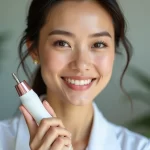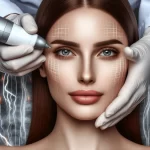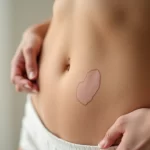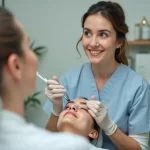Hair thinning is a common thing that impacts many persons, and while genetics and different factors play an essential role, diet can also substantially impact the health of your hair. The nutrients you consume allow all critical nutrients necessary for hair growth and strength. A diet abundant in vitamins, minerals, and proteins can boost healthier, thicker hair, although a deficiency can lead to hair thinning and loss. The foods you consume can significantly affect hair growth, strength, and general appearance. This blog explores how your Diet and Hair Thinning influences to boost healthier, thicker hair.
What is Hair Thinning?
Hair thinning happens when the hair becomes finer and the fuzz follicles shrink, leading to less hair density. This can lead to a mixture of elements, including hormonal changes, stress, medicinal drugs, and nutritional deficiencies. Although a few causes of hair thinning are inevitable, dietary changes can assist in mitigating the problem and improving hair wellness. So, if you are experiencing hair thinning, seek medical help. They will rule out the cause and do some tests, including skin cancer screening so that you can have the best hair treatment.
What is the Role of Protein in Hair Health?
Hair is mostly made out of keratin, a protein made of amino alkanoic acid. A deficiency of sufficient protein consumption can lead to weak, breakable hair that is more inclined to breakage. Counting the best protein sources in your eating routine is exceedingly significant for keeping solid and sound hair. You can get proteins from meat, fish, pulses, etc. Diet and hair thinning are directly proportional. Diet is equally important as medicines in Hair loss treatment.
What are Essential Vitamins for Hair Growth?
The following vitamins are really important for hair growth.
- Vitamin A is fundamental for delivering sebum, an oily substance that keeps the scalp saturated and hair solid. An insufficiency in vitamins can lead to a dry, fretful scalp and dead hair. You can get vitamin A from carrots, sweet potatoes, spinach, and kale.
- Vitamin C is an antioxidant that assists protect hair roots from oxidative stress induced by free radicals. You can get vitamins from citrus fruits such as oranges, lemons, and grapefruits, which are good vitamin C sources.
- Vitamin B, particularly biotin (vitamin B7), are basic for hair development and general scalp wellbeing. Absence of biotin can prompt hair thinning and going bald. You can get biotin from eggs, nuts, seeds, and whole grains.
- Vitamin D deficiency has been connected with going bald and thinning. This nutrient helps with making new hair follicles and lifts hair development. You can get vitamin D from sun exposure, fatty fish, egg yolks, and fortified foods like milk and orange juice.
Are Minerals Important for Hair Growth?
Following are the minerals that your hair needs.
- Lack of iron is an essential reason for hair thinning, especially in women. Iron assists RBCs carry oxygen to hair follicles; without enough iron, hair growth can be stopped. You can get iron from red meat, chicken, and seafood.
- Zinc plays an all-important role in hair tissue development and repair. It as well assists hold the oil glands close to the hair follicles working the right way. You can get zinc from oysters, beef, pumpkin seeds, and chickpeas.
- Magnesium is necessary for keeping up healthy hair follicles. An absence of magnesium can prompt balding. You can get magnesium from nuts, seeds, green veggies, and whole grains.
- Omega-3 fatty acids are all important fats that the body cannot develop on its own. These fats nutrify the hair. You can get omega 3 from fatty fish such as salmon, mackerel, and sardines. You can even give it to flaxseeds, chia seeds, and walnuts.
- Staying hydrated is fundamental for general wellbeing, including hair health. Drinking a lot of water assists in maintaining a healthy scalp and keeps hair from becoming dry and breakable.
What sort of Food should Avoid for Good Hair Growth?
Although concentrating on nutrient-rich foods is necessary, it is equally important to restrict the intake of foods that can negatively affect hair health. Processed foods, sweet snacks, and extra alcohol can lead to nutritional deficiencies and poor hair health. High-glycemic foods such as light bread and sweet cereals can have insulin spikes, which might add to hair thinning. Additionally, excessive caffeine can dehydrate the body and reduce hair growth.
Your diet and hair thinning are related in many ways. By integrating a diversity of nutrient-rich foods, you can boost healthier, thicker hair and reduce the chance of hair thinning. Concentrate on having enough protein, vitamins, minerals, and omega-3 fatty acids to support fuzz growth and strength. Always stay hydrated and fix the consumption of processed and sweet foods. Making these dietetic changes can lead to evident improvements in the wellness and appearance of your fuzz, giving you the self-confidence to face every day with a full, healthy head of hair.
When will you Need Hair Loss Treatment from Mobile Skin Screening?
If you are facing hair loss and hair thinning problems, You should seek help and the best Hair loss treatment in Metro Phoenix, AZ, from Mobile Skin Screening. Here, you can have all your hair problems resolved with simple procedures. Contact us now and get an appointment for whatever your hair problem is.
FAQs:
Q1: What dietary changes can help reduce hair thinning?
Ans: Integrating high-protein foods, vitamins (A, C, D, and B vitamins), minerals (iron, zinc, magnesium), omega-3 fatty acids, and staying hydrated can assist in slowing down hair thinning.
Q2: How does protein intake affect hair health?
Ans: Protein consumption fortifies hair by allowing all essential amino acids required for keratin production, keeping weak and brittle hair.
Q3: Which vitamins are essential for preventing hair thinning?
Ans: Vitamins A, C, D, and B vitamins, especially biotin (B7), are important for preventing hair thinning.




